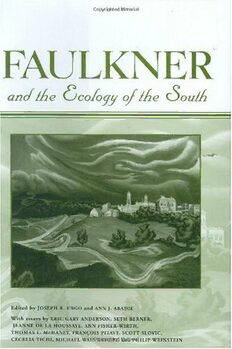
Faulkner and the Ecology of the South (Faulkner and Yoknapatawpha Series) PDF
Preview Faulkner and the Ecology of the South (Faulkner and Yoknapatawpha Series)
Faulkner and the Ecology of the South faulkner and yoknapatawpha, 2003 This page intentionally left blank Faulkner and the Ecology of the South faulkner and yoknapatawpha, 2003 edited by joseph r. urgo and ann j. abadie UNIVERSITY PRESS OF MISSISSIPPI jackson Disclaimer: Some images in the original version of this book are not available for inclusion in the eBook. www.upress.state.ms.us The University Press of Mississippi is a member of the Association of American University Presses Copyright © 2005by University Press of Mississippi All rights reserved Manufactured in the United States of America First edition 2005 (cid:1) Library of Congress Cataloging-in-Publication Data Faulkner and Yoknapatawpha Conference (30th : 2003: University of Mississippi) Faulkner and the ecology of the South / Faulkner and Yoknapatawpha, 2003; edited by Joseph R. Urgo and Ann J. Abadie. v. cm. Includes bibliographical references and index. Contents: “Old man” : shackles, chains, and water water everywhere / Cecelia Tichi—The land’s turn / Philip Weinstein—Environed blood : ecology and violence in The sound and the fury and Sanctuary / Eric Gary Anderson—William Faulkner, Peter Matthiessen, and the environmental imagination / Ann Fisher-Wirth—The enemy within : Faulkner’s Snopes trilogy / Michael Wainwright—Is Faulkner green? the wilderness as aporia / François Pitavy—The ecology of Uncle Ike : teaching Go down, Moses with Janisse Ray’s Ecology of a cracker childhood / Thomas L. McHaney—Visceral Faulkner : fiction and the tug of the organic world / Scott Slovic—McCrady’s La-fay-ette County / Jeanne de la Houssaye—Collecting Faulkner / Seth Berner. ISBN 1-57806-782-0(cloth : alk. paper) 1. Faulkner, William, 1897–1962—Knowledge—Southern States—Congresses. 2. Faulkner, William, 1897–1962—Knowledge—Natural history—Congresses. 3. Yoknapatawpha County (Imaginary place)—Congresses. 4. Southern States—In literature—Congresses. 5. Human ecology—Southern States—Congresses. 6. Human ecology in literature—Congresses. 7. Nature in literature—Congresses. I. Urgo, Joseph R. II. Abadie, Ann J. III. Title. PS3511.A86Z78321175 2005 813(cid:2).52—dc22 2005002380 British Library Cataloging-in-Publication Data available In Memoriam, Murry Cuthbert “Chooky” Falkner II November 22, 1928–April 23, 2004 This page intentionally left blank Contents Introduction ix Joseph R. Urgo A Note on the Conference xxiii “Old Man”: Shackles, Chains, and Water Water Everywhere 3 Cecelia Tichi The Land’s Turn 15 Philip Weinstein Environed Blood: Ecology and Violence in The Sound and the Fury andSanctuary 30 Eric Gary Anderson William Faulkner, Peter Matthiessen, and the Environmental Imagination 47 Ann Fisher-Wirth The Enemy Within: Faulkner’s Snopes Trilogy 61 Michael Wainwright Is Faulkner Green? The Wilderness as Aporia 81 François Pitavy The Ecology of Uncle Ike: Teaching Go Down, Moses with Janisse Ray’s Ecology of a Cracker Childhood 98 Thomas L. McHaney Visceral Faulkner: Fiction and the Tug of the Organic World 115 Scott Slovic McCrady’s La-FAY-ette County 133 Jeanne de la Houssaye vii viii contents Collecting Faulkner 153 Seth Berner Contributors 168 Index 171 Introduction It was the way he dried out—he took it out on bitterweeds. I think he had an obsession about bitterweeds—he always kept a hoe or two leaning against the side of the house, and when he had a hangover, or when things weren’t going well with his writing, he’d go out into the pasture and attack them. —Malcolm Franklin Bitterweeds: Life with William Faulkner at Rowan Oak I’m interested primarily in people, in man in conflict with himself, with his fellow man, or with his time and place, his environment. —William Faulkner, 1957 1 By ecology we do not exclude the natural world, though what we have in mind is more akin to the idea of a human ecology, the interaction of humans with their environment—made and found, communities as well as habitats. While Faulkner would often discount the importance or the centrality of the South because it was simply what he knew best, the fact remains that he did know it and the way he knew it is inextricable from the world he imagined in his fiction. To the terminologically weary, the nomi- native, ecocriticism, may be no more than theoretical dressing on what we’ve always known as setting, time and place, or environment. However, the recent school of criticism which calls itself ecocriticism (and which has an association and a journal1) has led to a renewed interest among literary scholars for what in this volume Cecelia Tichi calls “humanness within congeries of habitats and environments.” Faulkner scholars, such as Philip Weinstein, locate within Yoknapatawpha County “a precarious ecosys- tem” which may be illuminated in fresh ways through the application of ecocritical theory. The essays collected in Faulkner and the Ecological South probe Faulkner’s environmental imagination, seeking what Ann Fisher-Wirth calls the “ecological countermelody” of his texts. The term environmentseems to have held deep meaning for Faulkner; at least, that is, it was a word he relied on in public. Among the more resonant formulations upon which Faulkner relied while writer in resi- dence at the University of Virginia in the late 1950s was his statement of primary interest in “man in conflict with himself, with his fellow man, or ix
